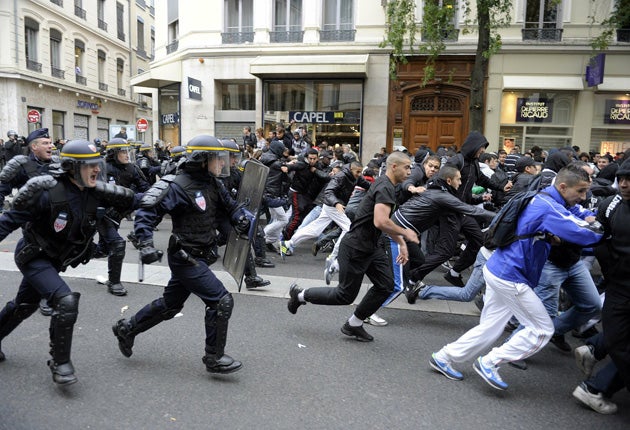France braces for riots as protests turn violent

Your support helps us to tell the story
From reproductive rights to climate change to Big Tech, The Independent is on the ground when the story is developing. Whether it's investigating the financials of Elon Musk's pro-Trump PAC or producing our latest documentary, 'The A Word', which shines a light on the American women fighting for reproductive rights, we know how important it is to parse out the facts from the messaging.
At such a critical moment in US history, we need reporters on the ground. Your donation allows us to keep sending journalists to speak to both sides of the story.
The Independent is trusted by Americans across the entire political spectrum. And unlike many other quality news outlets, we choose not to lock Americans out of our reporting and analysis with paywalls. We believe quality journalism should be available to everyone, paid for by those who can afford it.
Your support makes all the difference.A menacing new spectre hung over the French pension reform dispute yesterday – the threat of a re-run of the multi-racial suburban riots of five years ago.
As petrol shortages spread and the country braced for a new day of strikes and marches today, there were violent incidents and clashes between police and youths in a dozen cities and suburbs around France.
Although the incidents occurred on the fringes of demonstrations by Lycée (sixth-form) students, most of the violence came from roaming groups of hooded youths who were not directly involved in the protests against pension reform. Cars were turned over or burned and shops looted and smashed in Nanterre, west of Paris, and in Saint Denis, north of the capital, which was the starting point of the riots of October and November 2005.
There were also violent incidents on the edges of student demonstrations in other Paris suburbs and in Lyon, Rouen, Roubaix and Nantes. In all cases, both police and student leaders blamed independent, mobile, racially-mixed groups of casseurs – or "vandals" – who were not part of the pension protests themselves. Their motives were unclear, but similar violence by disaffected youths has erupted on the edges of other peaceful student protests in France in recent years.
Police responded with tear gas and rubber bullets and arrested almost 200 young people in more than a dozen incidents across the country. The government – already facing a disruptive pension reform protest by unions and Lycée students – will be desperate to avoid the kind of violent police response which could touch off more serious rioting in the tense multi-racial suburbs of French cities.
Yesterday's incidents, though none very serious in themselves, added to the sense of a nation spiralling into a multi-layered crisis. Over 3,000 – out of 13,000 – French petrol stations ran out of fuel yesterday after panic-buying by motorists intensified. Eleven out of 12 petrol refineries remained on strike. Flying pickets blocked a score of petrol distribution depots. Others were opened up by police.
A chain of pickets defeated attempts by the authorities to reopen a refinery at Grandpuits, east of Paris. Key employees were ordered to return to work under the threat of legal action but pickets from the refinery and other industries blocked entrances to the site.
There were also sporadic blockages and go-slows by small convoys of lorries on the principal French motorways.
All of these actions are part of an "unofficial" second front opened by militant union branches against President Nicolas Sarkozy's plans to raise the minimum retirement age to 62 by 2018. At least 3,000,000 people are expected to join demonstrations today, and many public sector workers to stop work for 24 hours, in a sixth union "day of action" in seven weeks.
The more moderate union federations want to continue their soft or "political" strategy of one-day protests to build public anger against Mr Sarkozy. They hope that that this will help to oust him in 2012. A centre-left president and government could then reverse the reform. But the moderate national union leadership fears that the harder-line, confrontational strategy of more militant unions branches could anger public opinion and present Mr Sarkozy with a moral victory.
Join our commenting forum
Join thought-provoking conversations, follow other Independent readers and see their replies
Comments